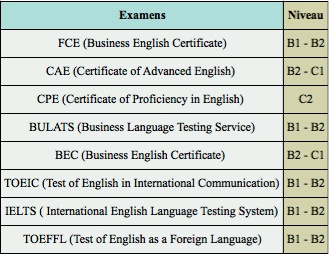It can be difficult to find your way around all English certificates available when you want to take one. Let’s keep it simple: the whole range of English exams is split up between two main organisations, namely the University of Cambridge ESOL (English for Speakers of Other Languages), which is British, and ETS (Educational Testing Service), which is American. What are the specificities of each exam and which one should you take? What elements should you take into account before enrolling? Here are a few tips to help you choose the right exam.
Before enrolling for an exam, the first step, which is very important, is to assess your language level. Many online tests are available free of charge and last just a few minutes. The language level is assessed according to the Common European Framework for Languages (CEFR):
A1: Elementary
A2: Upper elementary
B1: Intermediate
B2: Advanced
C1: Very advanced
C2: Level close to that of a native speaker
Secondly, you need to think about your motivations for taking an English exam.
If you need to do it for academic purposes, find out what level and exam is required by the university or school you wish to enter. Just like some American universities require the TOEFL before admission, a number of international universities require an advanced level of English. In the Netherlands and Scandinavia, for example, many university courses are taught in English (this is becoming increasingly common across Europe).
We can say without hesitation that English is indispensable on the job market. The level required is often specified in the job offer or indicated by the mention “English is a must”. An excellent level of English is often required in order to work for international companies or any company that has clients or suppliers abroad. In all cases, attesting your level with a diploma is a great advantage when you apply for the job.
The official Cambridge exams website shows you who recognizes the official exams (employers or schools).
Bear in mind that an exam attests your level at a certain point in time, which means it is only valid for a certain period of time.
Once you know about the prerequisites, you can start to refine your search and take into consideration only the English exams available for your level. Here is a simplified table of exams, classified by level:
The FCE, CAE and CPE exams are Cambridge ESOL’s most popular exams. These exams are recognised worldwide and have the same standards all over the world (same dates, same papers, all awarded by the University of Cambridge). We would say that those three exams are a safe bet. They test your reading, listening, speaking and writing skills.
The IELTS exam is different from Cambridge ESOL exams as it is based on a marking system with points, so it is closer to ETS tests like the TOEFL or the TOEIC. Minimal scores are usually required, whether to enter a university or apply for a job. When you take the TOEFL, English-speaking universities usually require a minimal score of 90 points. The TOEIC exam differs from the rest in that it consists of multiple-choice questions and does not test speaking skills.
There are a number of other exams, which are a little less known.
The KET (Key English Test) for level A2 and the PET (Preliminary English Test) for level B1. These two Cambridge exams certify two levels of the Common European Framework for Languages.
The BEC (Business English Certificate) is geared towards people with at least level B2 of English who need to attest specific language skills in order to work in an international environment.
Each exam has an official website, which can be found on the following webpages: https://www.cambridgeenglish.org/, http://www.ielts.org/.
There are official exams sorted by level for other languages but the principle is slightly simpler than for English exams.




